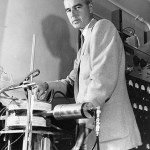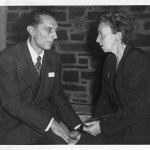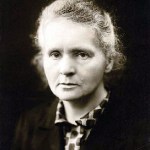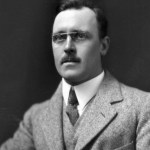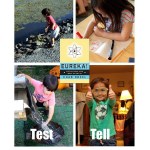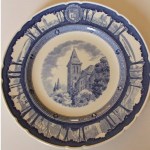Pop Culture
(That title doesn't quite scan as is, but if you stick an "a" in there, you can sing it to the tune of a song from "Fiddler on the Roof"... You're welcome.)
The last time I taught my "Brief History of Timekeeping" seminar was in 2012, so I spent a bunch of time on the Mayan calendar. This time around, we've lost the obvious pop-culture hook, but it's still so weird and fascinating that I spent a class on it last week. One of the things we talked about was what this system (what we know of it) says about the Maya concept of time. There's a very obvious contrast between the interlocking…
Dr. Tyson:
(I find the faux-familiar thing people do with "open letters" really grating, so I'm not going to presume to call you "Neil" through the following...)
First of all, I should probably say "Thanks," because I'm using some of your material in my class this term-- I had them read Stick in the Mud Astronomy, and contrast it with wacky Ancient Alien stuff, and gave them a second assignment based on Manhattanhenge, so that stuff's great. And I'm psyched to hear you've gotten your own talk show. So, you know, that stuff's awesome. Thanks.
And I should also note that while I haven't always…
Two new items about Eureka: Discovering Your Inner Scientist:
1) WAMC has now posted the interview I did with Joe Donahue on The Roundtable. This was a fun interview, and covers a number of examples from the book, so I think gives you a really nice sense of what it's all about.
2) There's a review of Eureka in New Scientist, along with two other books. It's fun to see all these different publications do reviews, because every reviewer latches onto a different example to feature. You can almost deduce the entire contents of the book if you read all of the different reviews...
The New Scientist…
Over on Facebook, my colleague Chris Chabris was talking up a smartphone game from a company he's associated with. Which of course got me thinking "Wait, why don't I have a smartphone game company?" (The Renaissance Weekend is also partly to blame, as I was one of about six people there who didn't have a start-up company of some sort...) Which, in turn, led to the realization that there really ought to be a quantum optics video game. Or maybe a series of games, because you could construct a whole bunch of puzzlers around quantum phenomena:
-- The most basic would be to do something like the…
"Hey," you say, "It's been, like, a week and a half since you did a post flogging Eureka: Discovering Your Inner Scientist. What gives?" Well, I've been kind of busy, and also the media world sort of goes into suspended animation over the stretch between Christmas and New Year's.
However, there's publicity stuff in the works. Specifically, the interview I recorded with Joe Donahue for The Roundtable on WAMC will probably air today. I'm not sure exactly when-- the show runs from 9am to noon, but I would bet on some time between 10:20 and 11:45, because I'm teaching a class then.
Anyway, it's…
A little while back, somebody on the Hold Steady fan message board put out a request for people's all-time Top Ten songs. This is a really hard question, but a fun one, so of course I couldn't resist. And since the overlap between there and here is pretty minimal, I'll recycle the message I sent for a quick and easy pop-culture blog post to ring out 2014 (links are to YouTube videos).
------------
Hard to rank-order these, because it's mostly a list of songs that have been personally significant to me at some point, so this is basically reverse-chronological autobiographical order. Which is…
One of the very best books I ran across in the process of doing research for Eureka is The Second Creation: Makers of the Revolution in Twentieth-Century Physics by Robert P. Crease and Charles C. Mann. It's an extremely detailed treatment of the development of quantum theory, and includes anecdotes that I haven't seen elsewhere. It also does a fantastic job of showing the essential interplay of experiment and theory through the difficult process of developing quantum field theory, which is often underplayed in popular treatments (which tend to be written by theorists, and often treat…
We're going to depart from the chronological ordering again, because it's the weekend and I have to do a bunch of stuff with the kids. Which means I'm in search of a story I can outsource...
In this case, I'm outsourcing to myself-- this is a genuine out-take from Eureka: Discovering Your Inner Scientist, specifically Chapter 2, which tells two stories from the career of Luis Alvarez, who I've talked about before in the context of his experiment to x-ray one of the pyramids at Giza, and the time I wrote him a letter when I was nine about his theory that an asteroid impact killed the dinosaurs…
Given that I am relentlessly flogging a book about the universality of the scientific process (Available wherever books are sold! They make excellent winter solstice holiday gifts!), I feel like I ought to try to say something about the latest kerfuffle about the scientific method. This takes the form of an editorial in Nature complaining that Richard Dawid and Sean Carroll among others are calling for discarding traditional ideas about how to test theories. Which is cast as an attempt to overthrow The Scientific Method.
Which, you know, on the one hand is a kind of impossible claim. There…
The winter solstice holidays are a time for family and togetherness, so building off yesterday's post about the great Marie Skłodowska Curie, we'll stay together with her family. Specifically her daughter Irène Joliot-Curie and her husband Frédéric. The Joliot-Curies are possible answers to a number of Nobel Prize trivia questions-- only mother and daughter to win, one of a handful of married couples, etc.-- but the scientific story about them that I find most fascinating is that their Nobel was for the third thing they did that could've earned them the prize, after they just missed out on…
There's no way I could possibly go through a long history-of-science blog series without mentioning the great Marie Skłodowska Curie, one of the very few people in history to win not one but two Nobel Prizes for her scientific work-- if nothing else, Polish pride would demand it. She made a monumental contribution to physics through her work on radioactivity (and through being nearly impossible to kill-- while her work on isolating radium made her ill for many years, she outlived an amazing number of her assistants...), and there are a lot of great stories about her.
This series is partly…
"You wanted to see me, Herr Professor?"
"Hans! Yes, come in, come in. Just going over the account books. Frightful amount of money going out of this place."
"Well, radium is expensive..."
"Ha! Oh, and speaking of which-- here's one of the sources. Absent-mindedly dropped the fool thing in my pocket last night when I locked up. Terrible habit, I really must work on that. Had a drawer full of the things in Montreal..."
"Thank you. And you wanted to see me about...?"
"Oh, yes. We have a new student, Hans, and I'd like you to put him to work on the gold foil project."
"Shouldn't he have his own…
Over at Medium, they've published a long excerpt from Eureka: Discovering Your Inner Scientist, that gives a good flavor of what the book's really like. It's about how the process for solving hidden-object games like the classic Where's Waldo books is comparable to the process used by Henrietta Leavitt to revolutionize our understanding of the universe:
There are multiple web sites and academic papers devoted to computer algorithms for locating Waldo within Handford’s drawings, using a variety of software packages, and these are impressively complex, running to hundreds of lines of code and…
"...and take care that all the signatures go in the right way round, eh, James? I was able to soothe Mr. Dance last time, but if another copy comes back to be rebound, M. de la Roche will put you out."
"Yessir."
"A little more care, there's a good lad. Run home, now, we'll see you in the morning." The apprentice scurried off.
The journeyman bookbinder checked again that the shop door was securely closed, pulled his coat tighter against the March chill, and turned to make the short walk to his own meagre rooms. Stuffing his hands in his pockets, he felt the folded pamphlet advertising tonight…
A few items for Sunday morning:
-- First and foremost, in just a few hours from now, I'll be signing books at the Open Door. If you're in Quebec or central Pennsylvania, you better leave now; Boston or NYC, you can have a cup of coffee first. Farther than that, you might try calling them around 11am ET to see if they'll ship you one...
-- The Albany Times Union did a short Q&A with me about the book. This ran Thursday, apparently, but didn't show up on Google, so I only found it this morning when I went to the Times Union site directly.
-- There's a good, thoughtful review in the…
One of the questions from a caller when I was on the "Think" show was about how to keep kids interested in science. As I said, the issue isn't so much creating in interest as working to not squelch the interest that's already there. Taking kids to cool places like zoos and science museums is a great way to do that, and just generally encouraging them to ask questions and try things out.
But if you'd like some more specific gift ideas, here's a selection of science-y things that SteelyKid and The Pip enjoy that you might try out on other kids of your acquaintance:
-- Magna-Tiles These. Are.…
Last week Kate pointed me to this post about heroic stories of science saying "This seems relevant to your interests." And, in fact, a good deal of the post talks about Patricia Fara's Science: A Four Thousand Year History, the Union library's copy of which is sitting on my desk, where I had looked something up in it just that morning. (Specifically, the part where Fara notes that the distinction between "science" and "technology" is largely a class-based fiction, dividing high-status philosophers from grubby practical mechanics.)
There are a bunch of things going on in this, and most of them…
I've been trying to keep to a roughly chronological ordering of these stories, but this slow-motion snow storm that was waiting to greet us on our return from Florida made the schools open on a two-hour delay today, which eats the time I usually use for blogging and books stuff. So I'm going to jump forward three hundred years, to a story that I can outsource.
To set the stage, in the aftermath of WWII, Richard Feynman took up a faculty job at Cornell, but between working on the Manhattan Project and the death of his beloved wife, he found that he was completely burned out, and not able to do…
Yesterday, I drove through the slush to Albany to do an appearance on KERA radio's "Think" from a studio there. The audio is at that link.
It was a bit of a strange experience, because I drove to a place to do the interview in a radio studio, but I was the only one in the room, taking questions from a disembodied voice. I enjoyed it, though, and the audio quality is a lot better than you would've gotten from even a land-line phone. This was a live show, including some call-in questions, and that always has a working-without-a-net quality that is kind of exciting. I got in a bunch of stories…
The final step of the scientific process is to share your results with others, and that's the step where things are most prone to breaking down. Countless great discoveries have been delayed or temporarily lost because the people who made them were more concerned with protecting "their" secrets than with sharing new knowledge with the world. A classic example of this, that I first heard from Michael Nielsen, is Robert Hooke in 1676 first reporting the relationship for elastic forces as "ceiiinossssttuv," which unscrambles to "ut tensio, sic vis," indicating that the force is proportional to…
